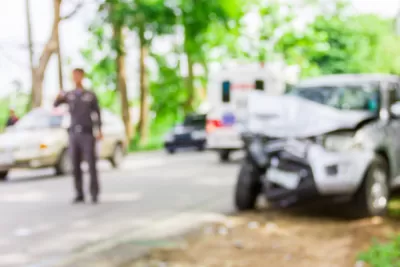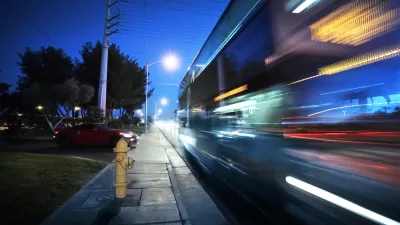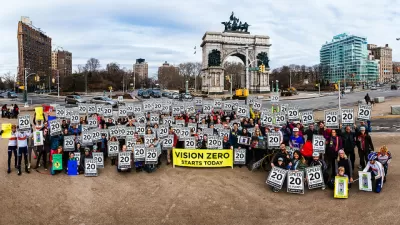The reckless and dangerous driving that has been a hallmark of the Covid-19 pandemic could become a more common, permanent feature of life in the United States.

Emily Baumgaertner and Russ Mitchell write for the Los Angeles Times about new traffic safety data that solidifies a dangerous trend that began during the pandemic.
"The latest evidence suggests that after decades of safety gains, the pandemic has made U.S. drivers more reckless — more likely to speed, drink or use drugs and leave their seatbelts unbuckled," according to the article.
The most recent data driving the conclusions expressed in the article were published in October by the National Highway Traffic Safety Administration. The report details traffic fatalities for the first half of 2021, when an estimated 20,160 people died in motor vehicle crashes—an 18 percent increase from 2020. (The carnage on U.S. roads during 2020 should not be underestimated based on this comparison, however.)
The article cites Ken Kolosh, a researcher at the nonprofit National Safety Council, to make the case that the trend of reckless, dangerous driving is likely to persist beyond the pandemic.
“I fear we’ve adopted some really unsafe driving habits, and they’re going to persist,” Kolosh said. “Our roads are less safe than they were pre-pandemic.”
According to the article, the reckless driving apparent in traffic safety statistics is mirrored in other reckless behavior during the pandemic: "Alcohol sales have soared, drug overdoses have set new records, and homicides have seen their biggest increase on record."
Frank Farley, a professor of psychology at Temple University in Philadelphia, is also cited in the article saying the pandemic has ushered in a "sea change in psychology." In the world after Covid-19, according to Farley, reckless driving is an arousal of "arousal breakout"—or a rebellious reaction to the restrictions of pandemic life.
FULL STORY: Car crash deaths have surged during COVID-19 pandemic. Here’s why

Alabama: Trump Terminates Settlements for Black Communities Harmed By Raw Sewage
Trump deemed the landmark civil rights agreement “illegal DEI and environmental justice policy.”

Study: Maui’s Plan to Convert Vacation Rentals to Long-Term Housing Could Cause Nearly $1 Billion Economic Loss
The plan would reduce visitor accommodation by 25% resulting in 1,900 jobs lost.

Why Should We Subsidize Public Transportation?
Many public transit agencies face financial stress due to rising costs, declining fare revenue, and declining subsidies. Transit advocates must provide a strong business case for increasing public transit funding.

Wind Energy on the Rise Despite Federal Policy Reversal
The Trump administration is revoking federal support for renewable energy, but demand for new projects continues unabated.

Passengers Flock to Caltrain After Electrification
The new electric trains are running faster and more reliably, leading to strong ridership growth on the Bay Area rail system.

Texas Churches Rally Behind ‘Yes in God’s Back Yard’ Legislation
Religious leaders want the state to reduce zoning regulations to streamline leasing church-owned land to housing developers.
Urban Design for Planners 1: Software Tools
This six-course series explores essential urban design concepts using open source software and equips planners with the tools they need to participate fully in the urban design process.
Planning for Universal Design
Learn the tools for implementing Universal Design in planning regulations.
Caltrans
Smith Gee Studio
Institute for Housing and Urban Development Studies (IHS)
City of Grandview
Harvard GSD Executive Education
Toledo-Lucas County Plan Commissions
Salt Lake City
NYU Wagner Graduate School of Public Service





























